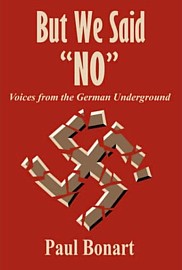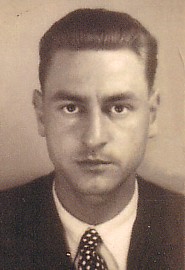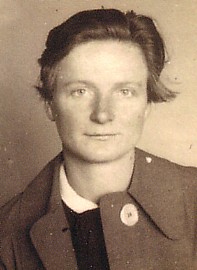Essay (back
to top)
Book Summary
Paul Bonart was only 21 years old when the Nazis took over Germany, and he decided to be one of the few non-Jewish Germans to oppose Hitler’s regime and all it stood for. His book, But We Said No: Voices From the German Underground, tells the story of his struggle to try and make a difference in a world that to him made no sense. Paul grew up in Germany when, following World War I, inflation was so bad he could not even afford a book of matches. There was an optical factory called the Carl Ziess organization that employed Paul in the town of Jena where he lived. Here he joined the Free Trade Union, and at their meeting he first heard a woman speak of the threat of Hitler. He showed concern and she invited him to join the ISK, Internationaler Sozialistischer Kampfbund (International Socialist Fighting Association), an anti-Nazi underground socialist party.
When Paul’s job transfered him to Berlin in 1933, he joined the ISK there, doing more advanced underground operations. Bertha was his ISK partner who helped him find sympathizers and deliver pamphlets. She became his wife after the war. They worked full time jobs during the day and did ISK work at night, until the Gestapo caught on to Paul. He was arrested and taken to the Gestapo headquarters he learned that two other ISK members had turned him in to try to protect themselves. Soon the two ISK members imprisoned grew to thirteen, the Gestapo was on to them so when interrogated, Paul sacrificed his own well being to distract the Gestapo and keep other ISK members out of prison. He did so by testifying to the innocence of others while admitting to some of his own guilt event though they were not as innocent and he was not as guilty as he had claimed.
Paul was kept in a cell at the Gestapo headquarters for seven months until he had a trial where he was sentenced two years in Zuchthaus (a maximum security prison), charged for preparation to overthrow the Nazi government. Zuchthaus was full of political prisoners, the majority being communists and none being hardened criminals. Paul was one of the youngest men there so the guards treated him the worst. When he was not punished in solitary confinement he took part in political arguments at night with the communist inmates. After two years Paul was released weighing forty pounds less and he was sent back to the Gestapo headquarters for an evaluation. He was smart and talked the Gestapo officers into letting him utilize his skills by working in Berlin rather than being sent to a concentration camp. His request was granted and he was placed under surveillance.
Paul continued underground work in Berlin unbeknownst to the Gestapo
officers who called him in frequently in an attempt to blackmail him into
turning in ISK members. Paul refused to cooperate and once more the Gestapo
began to catch on, not to him directly, but to Bertha. When Paul was able
to convince Bertha they had to flee Germany, they risked making their way
into Switzerland. Once in neutral territory they were still not safe and
had to move to Britain three months later. They joined the ISK in Britain
but things were never the same, as ISK members abroad refused to believe
that the ISK in Germany was in great danger or that Hitler meant war. Paul
and Bertha were removed from the ISK so Paul moved to the United States
to work and Bertha remained in Britain until Paul was settled and ready
for her to join him. Paul's job transferred him to Brazil in 1939 where
Bertha joined him and they were able to get citizenship [note:
on 9/9/08 Helga Spence wrote in Prof.
Marcuse's faculty guestbook that Paul never became a Brazilian citizen]
and remain safe from Germany for the rest of their lives.
Analysis
Bonart's book addresses many relevant issues with an honest unbiased
approach. Bonart reveals who was involved in the underground and how it
operated, what it was like to live in a Gestapo prison and how corrupt
the Gestapo really were, how the members of the underground within and
outside of Germany felt about their operation and its progress or lack
thereof, what the world outside of Nazi Germany thought of Hitler’s
regime and the possibility of war, and how Europe’s refugees were
accepted or more appropriately ignored by the rest of the world. Bonart
answered the questions that arise as he confronted these issues in his
life story as one of the few people in Germany who risked it all to try
and stop a regime that took the lives of millions. Bonart's book
demonstrates to the world that he and a few others were strong and brave
enough to stand up to the Hitler regime through underground action with
the ISK. He also presents the sad truth that most of the world at the time,
including the United States, either did not acknowledge the Holocaust or
they too were prejudiced and did not want Jewish refugees living in their
countries.
Bonart does not describe the underground in extreme detail, but with subtle truths to provide an accurate description. In 1932 the ISK had a newspaper and published for a united front against Hitler. It gained support from people including Einstein, but at the time there were too many political parties and the ISK had little effect (23). With Hitler’s rise to power the ISK had to be more careful not to get caught and soon their paper was outlawed (29). Bonart had difficulty contacting members when he would move, because everyone was unsure of whom they could trust (55). The ISK included women, Jews, and Germans. Their policy included being vegetarians. They were split up into groups only aware of those members in their small groups of 4 or 5, so if caught by the Gestapo this limited knowledge would keep the ISK from an ultimate demise (61). They operated by living normal lives during the day, and having secret meetings and spreading information through pamphlets and by posting illegal signs during the night. The posters said things like “Stop Hitler,” and the pamphlets were full of information about a different style of socialist government that would benefit Germany more than the Nazi regime along with stating how horrible Hitler’s government was for Germany (68). Bonart proves that to be a member of the ISK one had to be fully devoted and willing to compromise one’s life to help one’s country.
Bonart’s discussion of his time in prison is a very brief portion of the book, but very relevant. The prison consisted mainly of political prisoners like Bonart (89). In the prison their heads were shaved, they slept in rooms with 30 other men, they were allowed one piece of bread and one cup of soup daily, and they worked unthreading hemp sacks (89-91). The Communist prisoners claimed there were so many of them and so few men like Paul because they were the only group standing up against Hitler. The real reason there were so many Communists imprisoned was because their groups were easily noticed and therefore more of them were caught (98). Paul should have been treated well by the German guards because he was German, they said they did not like the way he looked at them so he was severely punished in solitary cells with minimal food for weeks (108). Paul did not regret having to go to prison, he does not address his reasoning but we can assume his cause was too important to worry about his own wellbeing.
When out of prison, Bonart witnessed whether the underground had made any progress. Bertha told him they had lost their fight, and in her opinion, “the things we are doing have no effect anymore. We will continue our fight but we cannot stop the madness. You and I will probably die” (110). When in Switzerland in 1937, they published a report to relay the true occurrences in Germany, but when read by the underground in Paris and London, the members of the ISK were upset by their report because they did not believe any of it. The ISK abroad believed they had better sources in Germany to tell them what was really going on, and they told Paul that he and Bertha were a disgrace to publish their report (150). It seemed as though the ISK either did not want to admit their failure as an organization, or that they were in denial and unaware of the realities because they were not in Germany. They did not think the underground was in danger in Germany, and therefore they looked down on Paul and Bertha for their escape. It does not seem possible that those outside of Germany could have been so naive, but Bonart’s story proves that even those who were against Hitler’s rise to power would not let themselves believe the truth, possibly because it was too hard to admit they could not stop him.
The next issue Bonart addresses is how the rest of the world felt about the events in Germany. He learned in the United States that the sterilization process was also used, that Italian-Americans were considered inferior, black people simply did not exist in certain towns, and that some believed the Jews had it coming. The man who said this about the Jews did so because he claimed they were in control of too many businesses in the United States. Bonart could not believe he said they had it coming because in Germany he could not think of one Jewish person in charge of a business. This shows first that the world did not realize Jews were not very powerful at all in Germany, and second that the reason for persecuting them is even more disturbing on the grounds that they did not prevent Germans from owning businesse. Another example of US sentiment was when Bonart was interviewed for a newspaper when living in New York in 1938, but the article could not be printed because it did not favor the US’s friend and ally, Hitler! (172-175). Through Bonart’s interactions with Americans at the time we learn how odd it was for the US to have such an optimistic philosophy when the Americans are in no way equals. The United States had similar prejudice among their citizens that the rest of the world did not see. Bonart saw prejudice from upper white class US citizens towards Blacks, Italians, and Jews.
As a German refugee, Bonart was eventually able to find citizenship in Brazil, but his journey to do so was not easy and many others were not so lucky. Bonart was supposed to go from the United States to Argentina, but when he tried he found he had been blacklisted by Germany (176). When in Switzerland he had a visa that did not allow him to work, when in England he had a three-month visa, and when he finally arrived in Brazil he had to get Aryan proof that he was not Jewish to become a Brazilian citizen. To do so his father sent his documentation from Germany that said he was not in any way Jewish. Brazil denied entrance of Jewish people at the time and neither Switzerland, France nor Britain would accept Germany’s refugees. Bonart explains how the rest of the refugees were treated through an example of the SS St. Louis that traveled with refugees from Europe, first to Cuba where they were denied access and then to the United States where they were not allowed to enter either. Eventually the hundreds of refugees who had traveled all that way were sent back to Europe and Germany where it was inevitable they would be killed (184). Bonart’s book shows how the world had no sympathy for refugees from Germany. England and France took in some refugees, but Bonart does not address this possible to make a point about how many people were without country.
Conclusion
In today’s world we question the German people and how they could have allowed such horrific events to take place. It is compelling to know that there were some who stood up for what they believed in even though their actions may have took their lives. I praise Paul and Bertha Bonart for their courageous accomplishments as human beings who devoted their lives to attempt to bring justice to such a corrupt world. Bonart’s book offers a new view and perspective to the Holocaust, suggesting if the world were better informed or would have acknowledged Hitler’s actions either by accepting refugees into their countries or joining groups similar to the ISK, they could have saved a few of the lives that were lost. Even though Bonart and the ISK were unable to overthrow Hitler, it was important that they tried. The few who survived may never feel they accomplished anything at all, but members of the ISK and other underground organizations compel us today to stand up for what we believe is just.
|


